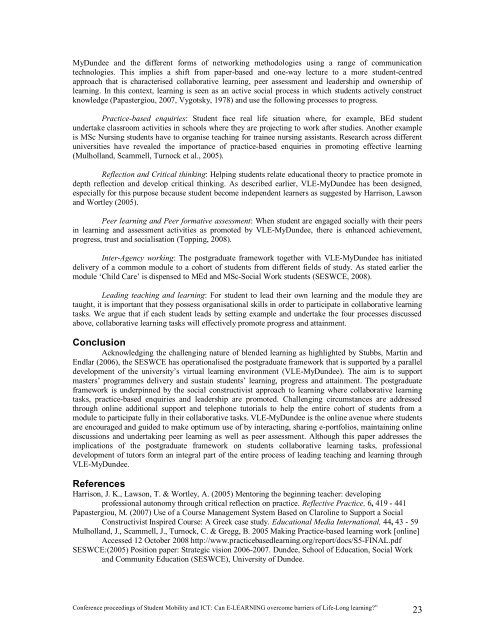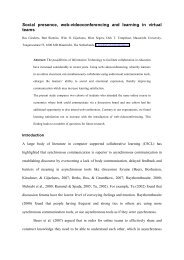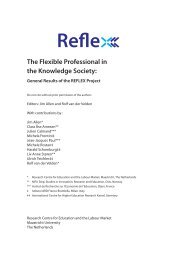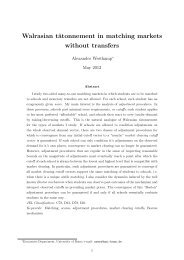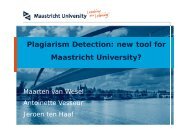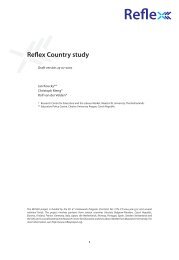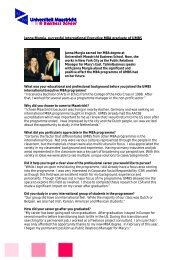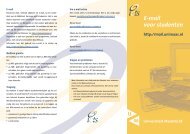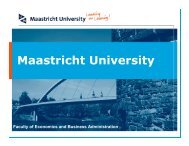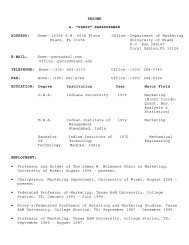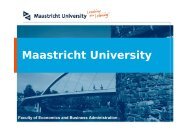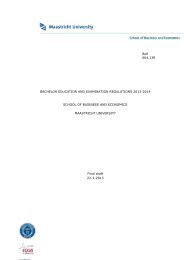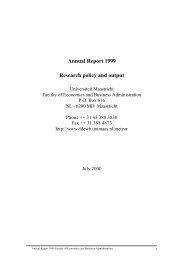proceedings of Student Mobility and ICT: Can E-LEARNING
proceedings of Student Mobility and ICT: Can E-LEARNING
proceedings of Student Mobility and ICT: Can E-LEARNING
You also want an ePaper? Increase the reach of your titles
YUMPU automatically turns print PDFs into web optimized ePapers that Google loves.
MyDundee <strong>and</strong> the different forms <strong>of</strong> networking methodologies using a range <strong>of</strong> communication<br />
technologies. This implies a shift from paper-based <strong>and</strong> one-way lecture to a more student-centred<br />
approach that is characterised collaborative learning, peer assessment <strong>and</strong> leadership <strong>and</strong> ownership <strong>of</strong><br />
learning. In this context, learning is seen as an active social process in which students actively construct<br />
knowledge (Papastergiou, 2007, Vygotsky, 1978) <strong>and</strong> use the following processes to progress.<br />
Practice-based enquiries: <strong>Student</strong> face real life situation where, for example, BEd student<br />
undertake classroom activities in schools where they are projecting to work after studies. Another example<br />
is MSc Nursing students have to organise teaching for trainee nursing assistants. Research across different<br />
universities have revealed the importance <strong>of</strong> practice-based enquiries in promoting effective learning<br />
(Mulholl<strong>and</strong>, Scammell, Turnock et al., 2005).<br />
Reflection <strong>and</strong> Critical thinking: Helping students relate educational theory to practice promote in<br />
depth reflection <strong>and</strong> develop critical thinking. As described earlier, VLE-MyDundee has been designed,<br />
especially for this purpose because student become independent learners as suggested by Harrison, Lawson<br />
<strong>and</strong> Wortley (2005).<br />
Peer learning <strong>and</strong> Peer formative assessment: When student are engaged socially with their peers<br />
in learning <strong>and</strong> assessment activities as promoted by VLE-MyDundee, there is enhanced achievement,<br />
progress, trust <strong>and</strong> socialisation (Topping, 2008).<br />
Inter-Agency working: The postgraduate framework together with VLE-MyDundee has initiated<br />
delivery <strong>of</strong> a common module to a cohort <strong>of</strong> students from different fields <strong>of</strong> study. As stated earlier the<br />
module ‘Child Care’ is dispensed to MEd <strong>and</strong> MSc-Social Work students (SESWCE, 2008).<br />
Leading teaching <strong>and</strong> learning: For student to lead their own learning <strong>and</strong> the module they are<br />
taught, it is important that they possess organisational skills in order to participate in collaborative learning<br />
tasks. We argue that if each student leads by setting example <strong>and</strong> undertake the four processes discussed<br />
above, collaborative learning tasks will effectively promote progress <strong>and</strong> attainment.<br />
Conclusion<br />
Acknowledging the challenging nature <strong>of</strong> blended learning as highlighted by Stubbs, Martin <strong>and</strong><br />
Endlar (2006), the SESWCE has operationalised the postgraduate framework that is supported by a parallel<br />
development <strong>of</strong> the university’s virtual learning environment (VLE-MyDundee). The aim is to support<br />
masters’ programmes delivery <strong>and</strong> sustain students’ learning, progress <strong>and</strong> attainment. The postgraduate<br />
framework is underpinned by the social constructivist approach to learning where collaborative learning<br />
tasks, practice-based enquiries <strong>and</strong> leadership are promoted. Challenging circumstances are addressed<br />
through online additional support <strong>and</strong> telephone tutorials to help the entire cohort <strong>of</strong> students from a<br />
module to participate fully in their collaborative tasks. VLE-MyDundee is the online avenue where students<br />
are encouraged <strong>and</strong> guided to make optimum use <strong>of</strong> by interacting, sharing e-portfolios, maintaining online<br />
discussions <strong>and</strong> undertaking peer learning as well as peer assessment. Although this paper addresses the<br />
implications <strong>of</strong> the postgraduate framework on students collaborative learning tasks, pr<strong>of</strong>essional<br />
development <strong>of</strong> tutors form an integral part <strong>of</strong> the entire process <strong>of</strong> leading teaching <strong>and</strong> learning through<br />
VLE-MyDundee.<br />
References<br />
Harrison, J. K., Lawson, T. & Wortley, A. (2005) Mentoring the beginning teacher: developing<br />
pr<strong>of</strong>essional autonomy through critical reflection on practice. Reflective Practice, 6, 419 - 441<br />
Papastergiou, M. (2007) Use <strong>of</strong> a Course Management System Based on Claroline to Support a Social<br />
Constructivist Inspired Course: A Greek case study. Educational Media International, 44, 43 - 59<br />
Mulholl<strong>and</strong>, J., Scammell, J., Turnock, C. & Gregg, B. 2005 Making Practice-based learning work [online]<br />
Accessed 12 October 2008 http://www.practicebasedlearning.org/report/docs/S5-FINAL.pdf<br />
SESWCE:(2005) Position paper: Strategic vision 2006-2007. Dundee, School <strong>of</strong> Education, Social Work<br />
<strong>and</strong> Community Education (SESWCE), University <strong>of</strong> Dundee.<br />
Conference <strong>proceedings</strong> <strong>of</strong> <strong>Student</strong> <strong>Mobility</strong> <strong>and</strong> <strong>ICT</strong>: <strong>Can</strong> E-<strong>LEARNING</strong> overcome barriers <strong>of</strong> Life-Long learning?” 23


